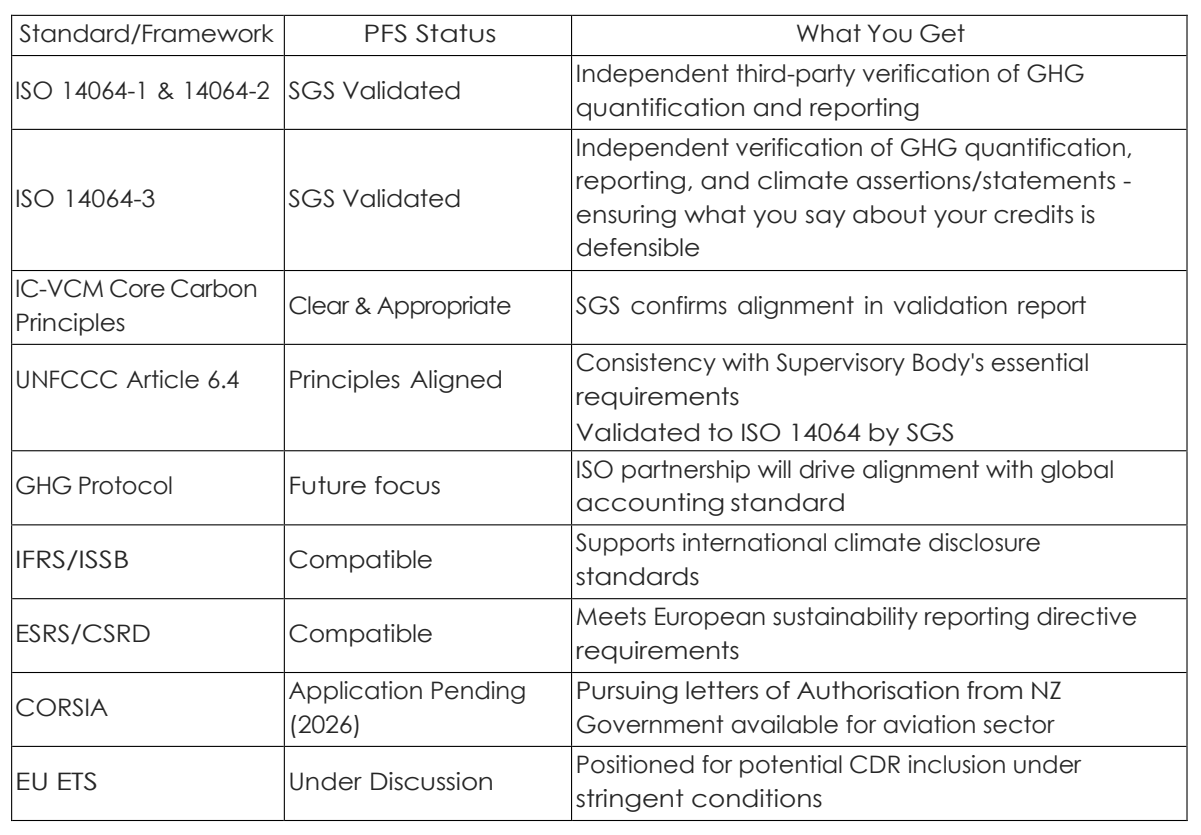
Premium New Zealand nature-based carbon credits designed for durability and integrity
High quality carbon credits validated by SGS to ISO 14064-1, 14064-2, and 14064-3 with legal permanence guarantees designed to meet the world's most rigorous climate reporting standards.
Reduction alone won't get us to net zero
The climate science is clear: we must both reduce emissions and remove CO₂ already in the atmosphere through to at least 2100. Even with aggressive decarbonisation, residual emissions will require high-quality carbon dioxide removals (CDR) through to at least 2100.
But not all carbon credits deliver what they promise. Some independently published studies calculate that projects verified to privately published standards have in the past only delivered on average 16% of the climate outcomes that they were supposed to.
Misleading climate claims expose companies to regulatory penalties, shareholder litigation, reputational damage, and loss of market access. Many countries now require proof that your carbon credit purchases genuinely help remediate climate impacts, not just transfer value between parties.
The stakes are too high for uncertainty which is why permanence, additionality, and independent verification matter more than ever.
To remove uncertainty, organisations need to invest in proven, nature based carbon removal solutions that are built to last
PFS Carbon Credits have been designed from the ground up to conform to the strictest criteria of quality, transparency, veracity and durability. To meet the PFS Standards, projects must demonstrate proof of legal and silvilculture longevity taking into account any potential risks. Complying with essential international regulatory requirements, they give you certainty that every tonne purchased is real, permanent, and defensible.
Through their registry operated by MUFG, PFS connects carbon buyers with New Zealand forest owners whose projects meet the highest standards for durable carbon dioxide removal. Our credits are validated to ISO 14064 by SGS, ensuring they withstand the most searching examination, including in a court of law.
Our carbon credits are founded on four key pillars:
New Zealand Based
New Zealand has a strong rule of law and land title guarantees backed by government allowing us to be sure of contractual durability. New Zealand also has a robust Bill of Rights providing assurance that there is no risk of the displacement of indigenous or poor communities.
The New Zealand environment means we have lower fire, pest, and mortality risks than most jurisdictions, as well as being less exposed to climate change risk than many. New Zealand’s geographic location means that our forests sequester carbon faster than global averages, reducing cost per tonne.
Proven Permanence
PFS credits include legal covenants against felling combined with a robust government-backed Torrens land title system, so we can guarantee legally enforceable carbon storage to 2100 and beyond. This means you can confidently claim long-term climate impact without reversal risk. Verification to the PFS Standard establishes adherence to the latest international requirements for permanence and non-reversals.
Demonstrable Integrity
Our credits are verified against the PFS Carbon Standard and are subject to verification by SGS to ISO 14064-1, 14064-2, and 14064-3. Validation against ISO 14064-3 ensures your climate communications comply with consumer protection laws and financial market participation requirements, not just climate reporting standards. Independent verification and registry services eliminates over-crediting, meets international standards and ensures your auditors, investors, and regulators can trust your climate claims.
No Double Counting
Our credits fall outside of New Zealand's NDC accounting and are not at risk of being claimed by the New Zealand government for their own reductions. This supports clear, defensible carbon accounting that meets voluntary market integrity requirements.
More than just carbon
PFS carbon credits are based on New Zealand forestry projects which vary by region, owner and context. All of our forestry projects deliver at least three SDG goals and other degrees of social and environmental co-benefits that strengthen your ESG narrative.
Depending on the specific forestry project PFS carbon credit co-benefits include:
SDG Goals: Climate action (SDG 13), Life on land (SDG 15), Peace, justice, and strong institutions (SDG 16)
Māori Partnerships: Direct collaboration with indigenous communities who form a large part of New Zealand's forest estate
Cyclone Remediation: Restoration of damaged land supporting local government resilience initiatives
Ecosystem Preservation: Providing resilience for local ecosystems and a productive use for marginal land
Biodiversity Protection: Native ecosystem restoration in one of the world's most unique natural environments
Economic Support: Fair returns to forest owners, consistent with UN Declaration on the Rights of Indigenous Peoples
Community Support: Local government partnerships for regional resilience
No Displacement: Unlike many CDR projects globally, New Zealand forestry doesn't displace indigenous or poor communities
Why you should consider PFS carbon credits
Transparency You Can Defend
Our standards are publicly published and validated by SGS to ISO 14064. No black-box methodologies or proprietary calculations that can't withstand scrutiny.
Legal Enforceability
New Zealand's Torrens land title system and strong rule of law mean permanence covenants are legally enforceable - not just promises.
No Over-Crediting
Baseline and end-of-project verification to ISO minimises the risk of under-delivery removing the risk of greenwashing.
Future-Ready Compliance
PFS is preparing to be future ready by complying with the UNFCCC supervisory Body requirements, CORSIA and other key international regulatory bodies.
Global Backing
Our registry is operated by a wholly owned subsidiary of MUFG (Mitsubishi UFJ Financial Group), one of the world’s largest financial institutions.
Article 6.4 Paris Agreement Compliance Our Methodologies Standard has been validated to ISO 14064-2 by SGS as “Best Practice for verifying forestry CO2 removals prove clear and appropriate consistency with the principles and essential requirements of UNFCCC Supervisory Body’s A6.4 methodologies where strict compliance not possible” and is aligned with Article 6.4 which means our clients can make credible, Paris-aligned claims without reputational risk.
Validated to ISO 14064-1 & 2 (by SGS) Independent third-party validation links PFS credits directly to global reporting standards (IFRS/ISSB, CSRD/ESRS) which means administrators and auditors can have confidence in reporting and disclosure compliance.
Validated to ISO 14064-3 (by SGS) PFS is validated to ISO 14064-3 for GHG statements and assertions. This protects buyers from misleading climate communications that could trigger consumer protection violations, securities law issues, or market participation restrictions.
Permanence & Non-Reversal Safeguards PFS Standard requires storage of CO₂ until at least 2100, and will align with UNFCCC Supervisory Body draft permanence rules providing assurance of lasting removals.
High-Integrity Forestry Methodologies The PFS Carbon Standards explicitly address additionality, non-reversal and leakage prevention, and are consistent with UNFCCC Article 6.4 meaning corporates and traders can prove true climate impact and investments meet ICVCM’s Core Carbon Principles.
Registry & Verification Infrastructure MUFG provides a secure registry and document repository so that credits are tracked transparently. Buyers and traders can have confidence in the market integrity, reducing risk of stranded or invalid credits.
ESG & Co-benefits Depending on the source project PFS carbon credits support ecosystem restoration, Māori community partnerships, land remediation, local government support and biodiversity resilience. Companies can demonstrate social and environmental leadership, enhancing brand value and investor trust.
FAQ
Q: How do I know these credits will remain stored until 2100?
A: PFS verifies only forests that can consent to legal covenants against felling, backed by New Zealand's government-guaranteed Torrens land title system and robust rule of law. SGS validates our methodology which proves long-term storage with scientific rigor that can withstand examination in a court of law. The Standard also requires silviculture and climate impact longevity is assured by experts.
Q: What makes PFS validation different from other standards?
A: We're validated to ISO 14064 by SGS, (the world’s leading Testing, Inspection and Certification company). Studies show projects verified to some private standards have delivered only 16% of claimed outcomes. ISO validation minimises over-crediting through rigorous baseline and end-of-project verification.
Q: Will these credits meet my CSRD/IFRS reporting requirements?
A: Yes. ISO 14064 validation links directly to GHG Protocol through ISO's strategic partnership, which integrates with IFRS/ISSB and ESRS/CSRD requirements. Our audit-ready documentation supports CDP, GRI, TCFD, and European sustainability reporting.
Q: Are PFS credits eligible for CORSIA?
A: We are applying for ICAO recognition in the 2026 round and are hopeful we will be able to provide Letters of Authorisation from the New Zealand Government, positioning credits for aviation sector use.
Q: Do corresponding adjustments apply?
A: Our credits are verified outside NZ's NDC accounting, ensuring no double counting and meeting voluntary market integrity requirements.
Q: What co-benefits do these projects provide?
A: Depending on the projects PFS carbon credits support Māori iwi communities, restore cyclone-damaged land, protect ecosystems, and provide fair economic returns. All consistent with the UN Declaration on the Rights of Indigenous Peoples. All projects will meet the SDG 13, 15 and 16.
Q: How much supply is available?
A: Currently expected to be 2 million tonnes CO₂ annually (after 30% insurance buffer), potentially scalable above this amount. However, there is a finite limit on available hectares of New Zealand forests meeting our permanence and verification standards.
Future-proof compliance for today's reporting requirements
PFS Carbon Standards are validated to meet the imperatives driving the voluntary carbon market and are positioned for emerging regulatory frameworks.
Compliance Table
View the PFS Standard for proven forestry carbon capture and storage.
The PFS Standard
Visit the PFS central information hub to view and download key material.
Resources
About
Discover more about PFS and the PFS Standard.



